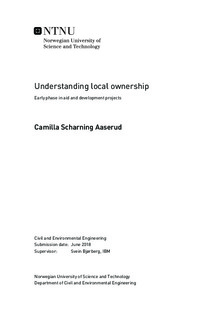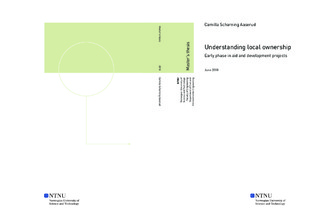| dc.description.abstract | The issue of the master thesis takes base in the Kakuma project - a collaborative project between NTNU School of Entrepreneurship and the Norwegian Refugee Council (NRC), where an Entrepreneurship HUB will be built in Kenya's largest refugee camp, Kakuma.
International aid and development projects are a way to improve the condition of countries that have %unstable or challenging conditions. Engineers Without Borders is an organization that offers expertise in such projects. Nevertheless, finding the technological solution is not always the only challenge. It is evident to have local ownership of aid projects, but it is still difficult to achieve. For some projects, the long-term result is a decaying and unused product, which in no way contributes to increased value for the local community. This master explores how projects are handled in the early stages, considering how to anchor the project in local ownership and the long-term impact they have on the local community.
This master thesis is written as a "Master with Meaning" through Engineers Without Boarders and the background for the chosen theme of this thesis was the interest in learning more about knowledge-based aid and development projects. The master is also inspired by the vision of NTNU, "Knowledge for a better world" and is written in the perspective of a civil engineering student.
The relevant research methods for collecting data were field work, interviews, questionnaires and literature study, where the former was not carried out due to bureaucracy. Qualitative interviews and questionnaires were suitable to get an insight in people's experiences and surroundings. A literature study gave an overview of relevant published research and state-of-art information.
The results showed an agreement in that local ownership is obviously essential but is still a challenge. Local ownership is described more as a feeling rather than legal rights, although it consists of both aspects. The early phase of development projects is a critical stage where the actual need is uncovered, and the long-term strategy is developed. The work done here also enhance the local anchoring of the project. The long-term success of an ID project is evaluated as the total impact of the project on society over time and is, among many factors, depended the early phase and local ownership. Documentation, planning for maintenance and utilize local technology are some helpful measures. | |

